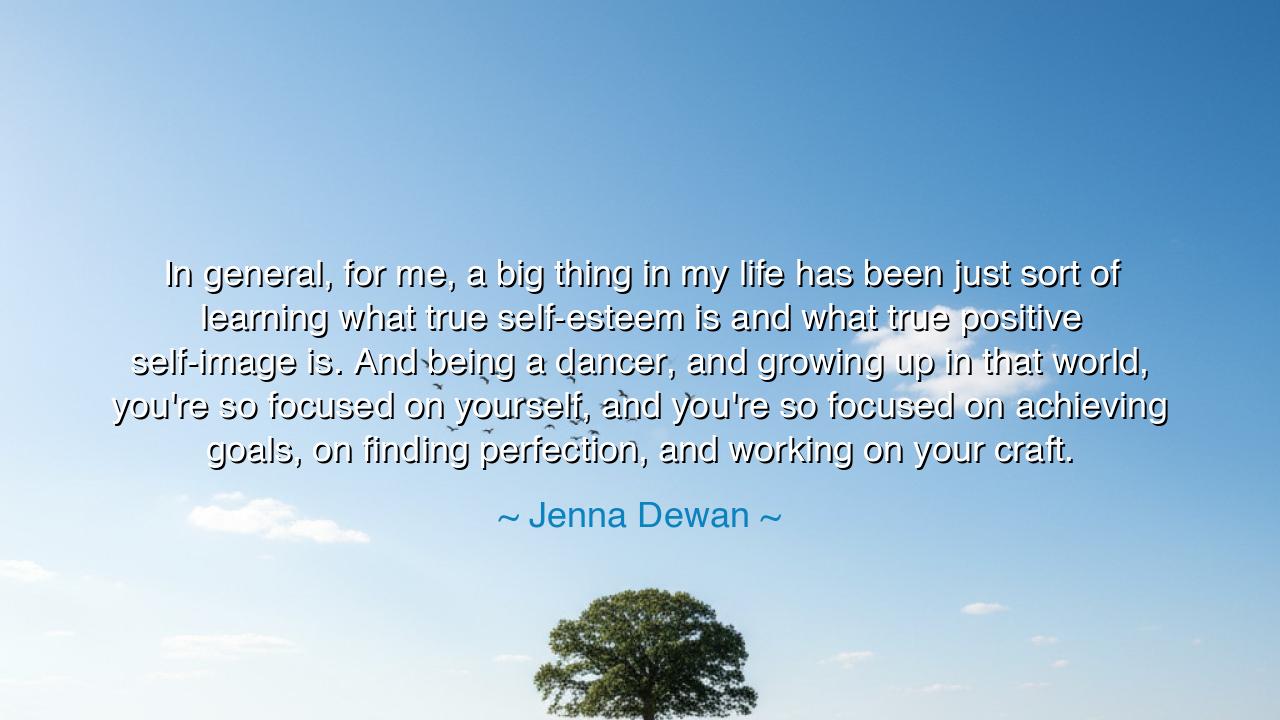
In general, for me, a big thing in my life has been just sort of
In general, for me, a big thing in my life has been just sort of learning what true self-esteem is and what true positive self-image is. And being a dancer, and growing up in that world, you're so focused on yourself, and you're so focused on achieving goals, on finding perfection, and working on your craft.






In the councils of old, the elders taught that a person is not a mirror, but a flame. Thus Jenna Dewan’s confession—“learning what true self-esteem is and what true positive self-image is… being a dancer, growing up in that world… focused on yourself, on achieving goals, on finding perfection, working on your craft”—sounds like a pilgrim’s journal written in chalk and sweat. She names the long crossing from praise-hunger to quiet strength, from polished surface to living core. The stage can crown you with applause and still leave the heart empty; the journey she describes is the discovery that worth is not a costume you put on, but a well you draw from.
To enter the temple of dance is to enter a hall of exactness: lines measured, turnout judged, feet blistered, corrections falling like rain. In such a place, the mind can mistake perfection for peace. You chase cleaner turns, higher leaps, sharper angles, believing that the next small victory will finally deliver self-esteem. But the elders would say: esteem born only of outcome shatters at the first stumble. True self-esteem is the hearth that warms whether the harvest is plenty or lean; positive self-image is the clear window that does not fog at a critic’s breath.
The paradox is bright: the more a young dancer gazes upon herself for judgment, the less she truly sees. Technique becomes tribunal; the mirror becomes magistrate. Dewan’s words mark the revolt against that court. She speaks of learning—not a slogan, but a practice—by which identity is tethered to values rather than victories, to devotion rather than display. The body remains an instrument of beauty, yes, but the soul ceases to be its hostage. In this turning, the artist becomes freer, and the art, more human.
Hear a story from another studio and century. Martha Graham, early in her career, was told that her body was “not right” for the prevailing ballet ideal. Instead of bowing to the mirror’s tyranny, she forged a new grammar: contraction and release, the breath made visible. Critics first scorned, then listened, then learned. Graham’s esteem did not rest on fitting a silhouette; it rested on faithfulness to an interior truth. Her craft deepened not because she flattered an audience, but because she answered a calling. This is the arc Dewan points toward: achievement in service of essence, not essence in service of achievement.
Another tale lives closer to common life. A student rehearses a solo for weeks, chasing perfection until sleep thins. On the night of performance, she slips. The old script whispers: “You are less.” But a teacher kneels and asks, “What did your courage do?” The student recounts the recovery, the breath taken, the phrase resumed. Applause becomes secondary; the real victory is the integrity that didn’t leave her when balance did. In that moment, self-esteem is re-sown on firmer ground: I am not my error, and I am not my ovation; I am the one who returns to the music.
From these witnesses, gather the meaning of Dewan’s testimony: goals and craft are noble, but they are lamps, not gods. Let practice refine you, but let identity anchor you. There is holiness in the hour bar, the repeated phrase, the drilled passage—but only when the heart knows that worth precedes work. The artist who believes this dances looser and loves longer; she can listen to correction without collapsing, take rest without guilt, and share the stage without fear that light is scarce.
Let counsel become action. Begin a daily ritual of esteem that is independent of result: write one sentence each evening naming a virtue you practiced—discipline, kindness, courage, patience—not a metric you achieved. Keep a “mirror fast” before big performances: ten minutes training with eyes closed, feeling alignment from inside out. Pair every goal with a value—“thirty clean fouettés” with “steady breath and soft jaw.” Build a circle that speaks to essence: invite friends who praise process, not just product; learn to bless another’s brilliance without dimming your own. And rest as a rite of devotion to your craft: fatigue is a poor sculptor of soul.
Finally, remember this elder law: you become what you rehearse. If you rehearse contempt for yourself, you will dance small even in great halls. If you rehearse reverence—learning to befriend your limits, to honor your body’s weather, to weigh success by fidelity—you will carry a stage within you wherever you go. Then the mirror will be a tool, not a judge; the goals will be companions, not chains; and your self-esteem will be a quiet, enduring music, guiding your steps long after the curtain falls.






AAdministratorAdministrator
Welcome, honored guests. Please leave a comment, we will respond soon